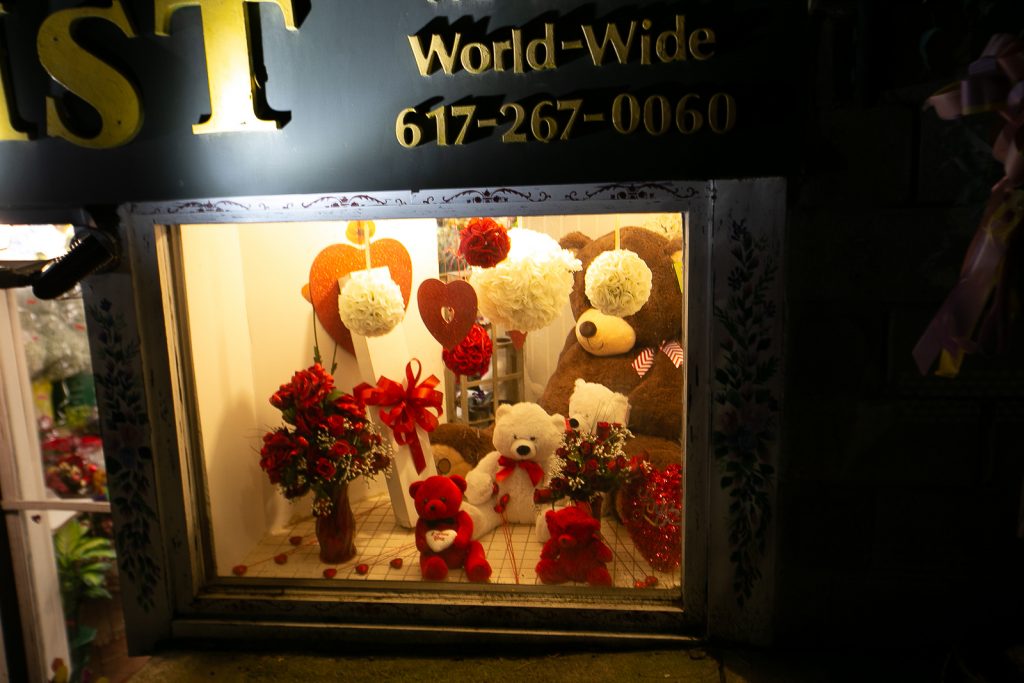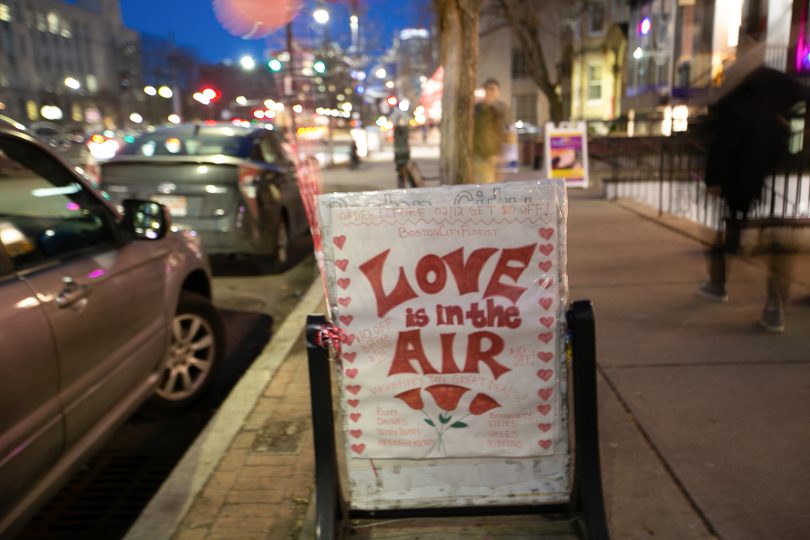By Dave Sebastian and Anqi Zhang
BU News Service
BOSTON — A Thursday preluding the long weekend, temperatures nearing 40 degrees and an uptick in date-night spending make a strong potion for Valentine’s Day sales in 2019.
As office workers had the option to either stay at home or leave early during the Feb. 12 snowstorm, store and restaurant workers continued to prepare orders and handle reservations in light of Valentine’s Day, Boston retailers and restaurant operators told BU News Service.
Sweet N’ Nasty, an adult bakery near Hynes Convention Center that sells cakes studded with genital-shaped decorations, is slated to post better sales than that of Valentine’s Day in 2018, Niki Novak, the shop owner, told BU News Service. A “good economy” and sunnier weather would help drive traffic into the store, she said.
“We are always busy on Valentine’s Day; it starts like a few days before, and sometimes even goes a little bit after, for the weekend,” Novak said at the store, outside of which stands a blackboard chalked up with “Don’t Forget Your Valentine!” in pink. “But online [sales] is pretty much the same.”
Fewer U.S. consumers are expected to celebrate Valentine’s Day in 2019, but those who do are likely to spend a record amount of $20.7 billion Feb. 14, according to a Jan. 30 survey by the National Retail Federation and Prosper Insights and Analytics.

About 16 percent of shoppers visited florists for Valentine’s Day, while 14 percent opted for small and local businesses, the survey found. Department stores topped the list at 35 percent as the most popular Valentine’s Day shopping destination.
The average Massachusetts resident spent $53,267 in personal consumption in 2017, well above the national average of $40,878, according to latest Bureau of Economic Analysis data.
Valentine’s Day lands on a Thursday in 2019, and that provides an opportunity for retailers and restaurants to boost sales during the week and on weekends preluding and preceding Feb. 14, Steve Clark, vice president of government affairs at the Massachusetts Restaurant Association, told BU News Service.
“When Valentine’s Day falls on a weekend, well that’s generally following during the busy time anyway, so they’re not seeing as much of an uptick in business that they normally get on a different day,” Clark said.
Retail sales dependent on weather, holiday season
It may be sunny on Feb. 14, but the sunlight can’t thaw the sales freeze retailers endured during January and February snowstorms and wind chills.
The historic grocery store DeLuca’s Market, which offers Valentine’s Day-theme chocolate, cookies and gift baskets, is expected to post stagnant sales in the 2019 Valentine’s Day season, Anastasiya Babrouskaya, the store’s marketing assistant, told BU News Service.
“It’s a small business,” Babrouskaya said during the Feb. 12 snowstorm. “People don’t go out and come here when it’s bad weather.”
For Boston University-based flower shop Boston City Florist, the demand kept rolling regardless of weather, Brigid Mack, a shop assistant at the shop, told BU News Service Feb. 11.
“Christmas was pretty busy, but this is definitely the busiest I have ever seen,” said Mack, who has been working at the Commonwealth Avenue store since October 2018. “Some of orders we got from online. Right now, we are getting a lot of phone calls. Sometimes people come in to set orders, but it’s mostly phone calls.”
Restaurants see more flexibility
Restaurants have more chance in redeeming a Valentine’s Day clouded in bad weather than their retail counterparts, said Philip Frattaroli, the managing partner and CEO at Filmark Hospitality Group, which manages Greater Boston restaurants Ducali Pizzeria and Bar, Filippo Ristorante, Ristorante Lucia and Cunard Tavern.
“What’s different about the restaurant industry versus, maybe, florists: It’s really not just about Valentine’s Day,” Frattaroli told BU News Service. “It’s not really as all-or-nothing as it would be for florists.”
If restaurant traffic declines due to bad weather on Valentine’s Day, “that would mean the weekends that would be a little bit busier,” Frattaroli said.
Most of the group’s restaurants have been fully booked — as early as two months in advance — for Valentine’s Day, with the Ristorante Lucia locations in the North End and Winchester being the most popular, Frattaroli said.
And on date nights, couples aren’t likely to bail on their restaurant reservations, he said.
“People plan ahead,” he said. “People have to get babysitters or make plans.”
Among the upscale restaurants that have been fully booked through the weekend is Top of the Hub, which overlooks the Boston skyline on the 52nd floor of the Prudential Center. Though adjacent with other popular date-night spots, Top of the Hub has seen the benefits of its competition in the form of foot traffic, said Mostafa Hadria, the restaurant’s director of hospitality and guest services.
How about single people?
Single people also have a stake on Valentine’s Day, and it’s evident in restaurants like Shojo in Chinatown.
The underground restaurant offers an anti-Valentine’s Day-themed drinks special that in past years attracted groups of four to six people, and it has seen an increase in reservations for Feb. 14, Shojo co-owner Brian Moy told BU News Service.
“It encourages more single people,” Moy said. “We tend to see groups of females coming in and having kind of a girls day out.”
Alcohol sales at Shojo usually increase on Valentine’s Day. But unlike restaurants that are focused on attracting couples, Shojo is not expected to see a significant increase in traffic, Moy said.
Some restaurants “are geared towards a win-win situation where the guest has a perceived value of benefit of the deal,” Moy said. “But then on the back end, the restaurant actually tailors those on the higher profit percentage. Overall, their night would be higher business.”




